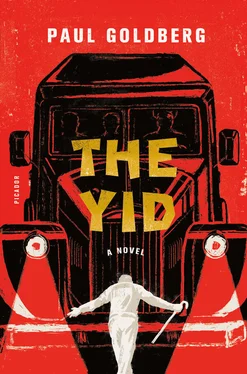“It’s done,” he says.
“But it’s still brown,” protests Levinson. “You told me to add lard! The blood did not turn red!”
“I didn’t say it would. Why should it?”
“What do I do with this? This dreck? I wanted red!”
“Do what you want, mayn komandir .”
* * *
Theater historians haven’t understood that Levinson had to steal his sole artistic triumph.
After the success of Kinig Lir , its translator, the playwright Shmuel Halkin, was commissioned to interpret the story of Bar-Kokhba, the leader of a Jewish rebellion against Rome.
The timing infused the old story with urgency. Fascism was on the rise. Indeed, it seemed unstoppable. Young Jews, whether Communist or Zionist, were scouring history for strong leaders. The Maccabees made a triumphant return, as did Bar-Kokhba, a rebel who was pronounced the messiah by none other than Rabbi Akiva.
Of course, Levinson loved the play and the komandir it glorified. Alas, due to his own history of rebellion — an effort to oust Mikhoels — he was relegated to being an extra. He had two parts: As a Roman soldier, he had to walk ominously and stand silently. Then he had to make an appearance as an old Jewish sheepherder who comes to swear allegiance to Bar-Kokhba.
In this role, Levinson had to look mildly decrepit and carry a shepherd’s staff. It was a harmless part. He was contained, dissolved into the crowd as Rabbi Akiva blessed the rebels.
At the premiere, as freshly blessed rebels stood in their assigned positions, Levinson threw down his ridiculous staff and grabbed a dagger out of the hands of an unsuspecting rebel, then another dagger out of another set of hands and, continuing on a mad trajectory, became airborne, then went completely motionless as the bottom of the velvet curtain touched the stage.
This acrobatic feat triggered a standing ovation mid-play. It was noted in all the reviews. Mikhoels was furious. He would have used this act of insubordination as an excuse to fire the madman. Halkin, however, thought it was a brilliant interpretation that emerged organically after the dress rehearsal.
“Eto nakhodka,” Halkin said to Mikhoels in Russian. “This is a find.”
And a find it was. Is there a better way to portray the unfurling of hidden power than an unexpected pirouette with smallswords?
The fact that many members of GOSET audiences were non-Jews is largely forgotten. They flocked to the theater because it was one of Moscow’s best. Levinson’s acrobatic feat transcended language.
It worked so well that Halkin convinced Mikhoels to abandon his reservations about Levinson and move him to the part of Bar-Kokhba. This couldn’t happen in Moscow, but it did happen when the play was taken to the provinces.
It is no small feat that during the summer of 1938 Levinson toured the former Pale of Settlement, portraying the strongest of strong Jews, a man whose name means Son of a Star, the defier of Rome, and a messiah to boot. The play had to be altered for Levinson. The singing parts had to be dropped, because Levinson was able to carry a remarkably narrow range of notes, had no notion of tonality or rhythm, and, overall, sounded goat-like.
Spectacular stage combat beats hokey singing every time. The son of a whore made a fine Son of a Star.
When Levinson uttered Bar-Kokhba’s final words—“The struggle isn’t over! Forward!”—the character’s and the actor’s experiences became one and the same. What difference did it make what came first? What difference did it make what trumped what? Who the hell was Mikhoels, who the hell was Stanislavsky, to pronounce themselves arbiters of right and wrong when it was the leap that told the story, the whole story? Halkin understood that, God bless him.
This was Levinson’s final contact with the millions of Jews who inhabited the areas of western USSR. Within three years, the people who applauded Levinson’s Bar-Kokhba would think of his heroic leap as they met death at the edges of deep ditches, the omnipresent chasms where the stage ended.
And — yes — other strong Jews remembered Levinson’s leap as they stormed the Nazi positions, spraying from the gut.
Levinson’s battle continued as well.
* * *
A loud knock on the dacha’s door makes the three men take their battle positions.
Has it begun?
The choices they make reveal their inner selves and how they feel about inflicting death.
Moisey Semyonovich reaches for a pistol.
Der komandir lets his smallswords flash, retreating behind the door. He’ll be the first to greet the intruders. Kogan takes no weapon at all.
They wait silently for another knock. The person outside can surely see the smoke rising through the chimney and the flickering of the yellow, halting light of the kerosene lamp.
Moisey Semyonovich throws open the latch, then stands aside.
The door opens slowly, and, like a vision from her own youth, a woman in a shapely karakul coat strides into the center of the room, and with a smile that once could have been tragically misconstrued as seductive (it was, in fact, sarcastic), giggles. “Oy mal’chiki, mal’chiki … puglivyye vy u menya?” Now, my dear boys … aren’t you fearful?
* * *
“Ol’ga Fyodorovna, dear, to what do we owe the pleasure?” asks Kogan.
“Vy pomnite, u Anny Andreyevny bylo takoye…” Do you recall, Anna Andreyevna wrote about this?
Everything has been plundered, betrayed, sold out,
The wing of black death has flashed,
Everything has been devoured by starving anguish,
Why, then, is it so bright?
Kogan is familiar with the poem, from Akhmatova’s Anno Domini MCMXXI , and it takes considerable effort for him to refrain from reciting the rest.
“Why, then, is it so bright?” he asks instead.
“Otchego zhe nam stalo svetlo?” Ol’ga Fyodorovna repeats.
“Are you personally acquainted with Anna Andreyevna?” asks Kogan, who, alas, is not.
“Cooing like little birds,” Levinson whispers to himself. Onstage, this would be an aside. Around the table, it is rude.
“Yes. She hates me with a passion.”
“Something political?”
“Something amorous.”
The night is overcast; the light from a quarter moon is filtered through the clouds. For half a kilometer, they pull the corpse-laden sled. With rope across their chests, they pull horse-like on trampled snow, with not a human soul in sight. Only the dogs howl.
“Where did you learn to handle corpses?”
“A morgue. Where else? After the orphanage, that was my job.”
Compared to Tatyana, this girl seems as cold as the weather, except her bright eyes speak of something trapped within. An argument can be made that Kima is just like Lewis.
After Tatyana’s death, Lewis had multiple interludes with Russian, Ukrainian, and Jewish nurses at a military hospital in Novosibirsk, but these women regarded love as a step that followed and preceded consumption of vodka, onions, and herring. It was a quasi-medical procedure, a brand of treatment for the human condition.
The majority of able-bodied Russian men had gone to the front, and many of those who returned were able-bodied no more. As an intact male, Lewis could have all the vodka, onions, herring, and love he could possibly want. Being a Negro continued to be an advantage. He represented a new type of procedure for the curious nurses.
* * *
The layers of burlap are safeguard enough. He feels no cold. He doesn’t see their vacant eyes or their clear, pale skin.
Kima’s movements are economical, tight. She opens the sacks and stuffs them with bricks she found in the shed next to the dacha. Four bricks for Kent, four bricks for Tarzan. Lewis takes her orders, lifting a sack onto the edge, giving a push.
Читать дальше












